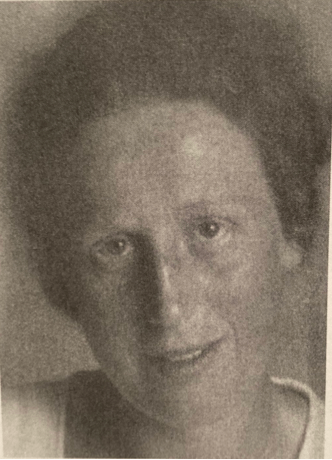
Lili Simon was the daughter of the timber merchant Fritz Simon. She was born in Königsberg in 1908 as the oldest of four siblings. In 1920 the family moved to Bremen. Her father had three grandparents of Jewish origin and was considered a “full Jew” according to the “race laws”, and Lili as “half-Jewish” developed an interest in theology in her childhood. The relationship between Jews and Christians would become the focus of her theology, her own identity and the key to her existence.
After graduating from high school in 1928, Lili began studying theology and philology in Bonn. She studied with Karl Barth, who had taught in Bonn since 1930. As one of the inner circle of his students, she gave seminar presentations, asked and responded to his questions, and would maintain correspondence with him until his death in 1968.
In 1932 she moved to the University of Erlangen and received her doctorate in June 1933 under Benno von Wiese with a thesis on Goethe, graduating “summa cum laude”. However, as a “half-Jew” she was not allowed to take the state examination. Thereupon she emigrated in October 1933 convinced that there was no future for her in Germany, partly because of her Jewish ancestry, and partly also because of her political views. Like Barth and others, she opposed the developing nationalism that would emerge under the National Socialists.
She came to Switzerland via England and France, where she did language studies, and passed the theological faculty examination in Basel in July 1936. But she only had permission to study in Switzerland and had to find work elsewhere. From a distance, she watched what was happening in Germany and wrote to Karl Barth on January 1, 1935: “It is often incredibly difficult for me to be so far off the beaten track and alone. […] I am shocked and I cannot understand why our church, which has appeared as a “confessing” one, is so silent and hesitates.”

From September 1936 Lili Simon taught at the school for Jewish children run by the Church’s Ministry among the Jewish People (CMJ) in Bucharest, Roumania.


After the pogrom in Roumania against the Jews in 1941, she fled to Palestine. There she joined the Anglican school run by CMJ in Tel Aviv, teaching English language and literature. In 1944, through the mediation of friends, she found employment as an English teacher at the Hebrew speaking Rehovot grammar school, where she was known as a Christian. For Lili, the years in Palestine/Israel were far more than just another stop on the run from the Nazis; the land became her home.

Lili must have been very surprised to receive this letter, though unfortunately we cannot tell when:

Lili longed for a state in which Jews and Arabs could live together, and worked to create understanding between Israelis and Palestinians, and between Jews and Christians. As a German and a Christian, she was exposed to questions like: “What do you have in common with Jesus, as your Gospels show him? From a saving remnant you have become an aggressive majority, from being persecuted you have become the persecutors! Persecuted Christ yes – but Christians, no!” She wrote to her friend and teacher, Karl Barth – “that is my daily bread in Eretz-Israel ”(letter sent on September 17, 1947).
Lili applied for both British citizenship and Palestinian passport (see pictures below), as a “Hebrew Christian”[more information needed here].
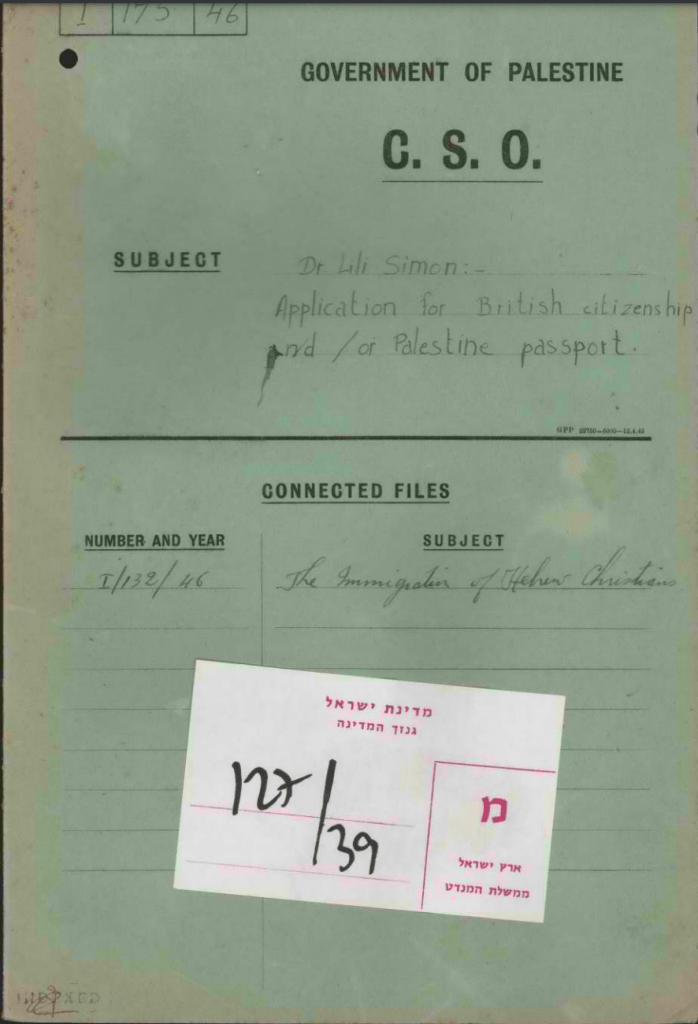
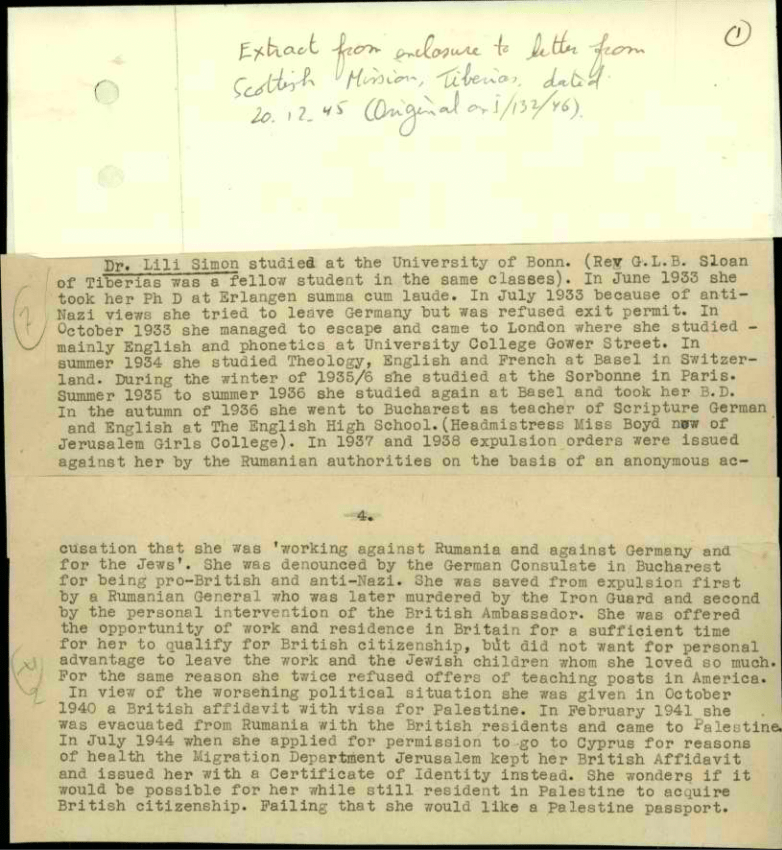

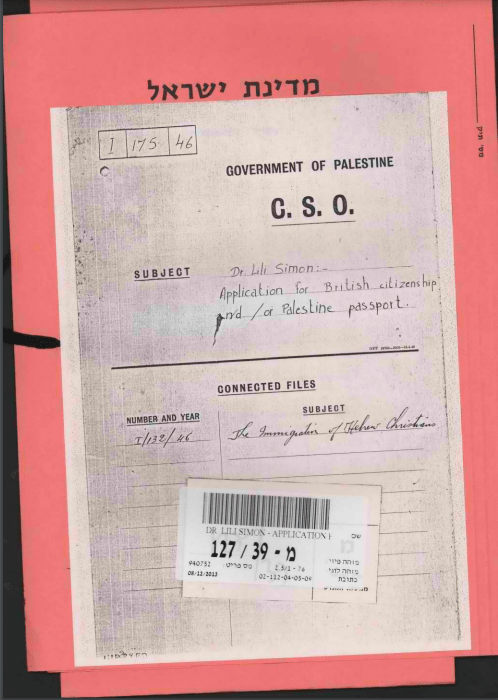
In 1952 an eye operation forced her to return to Europe. The doctors advised against a permanent stay in Israel, and in 1953 she returned to Bremen. This was followed by years of tough struggle for reparation (financial compensation), which was urgently needed because of her difficult economic situation. But this was refused many times because she left Germany “voluntarily”. Finally, after several court cases, she was awarded compensation.
Lili also was appointed to a lectureship in religious education at the newly-founded University of Education in Bremen. But this was resisted by the institution and Lili Simon found herself working in a climate characterised by disinterest and wanting to be free from any ecclesiastical influence. Lili found little support from the local pastors and felt abandoned by the Bremen Church. Despite enjoying the work with the students, she gave up her job at the university and in 1958 was assigned to the State Youth Ministry of the Rhenish Church.
A progressive illness forced her to adopt a less active lifestyle. She hoped to find this at the Youth Academy in Radevormwald, where she taught contemporary literature and Judaism from 1964. She also led weekend conferences, which were very well received. But the work of the academy was focused on psychological and socially-oriented group dynamics. In Lili’s view, theology was insufficiently represented, and this led to conflicts with the Youth Academy. Unwilling to compromise on the importance of theology, she retired in 1972. Lili continued her extensive conference and lecturing activities – most recently confined to a wheelchair – whenever possible. Shortly after traveling to Israel on her 80th birthday, Lili died of the consequences of an accident on January 6, 1989.
Reflection and Prayer. Discovering this lady, a student of Karl Barth, a gifted theologian and teacher, and a refugee whose travels took her through England, France, Switzerland, Roumania and Israel, I am full of wonder at how her life reflected not only the travails of her times, but the faithfulness of God to his people Israel. How I would love to have met her, and hear her story at first hand, her life of prayer, her theological and political concerns, and the impact that she had on her friends, students and disciples. I look forward to meeting her in heaven!
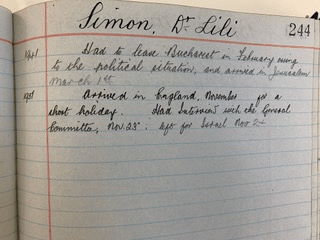
Lili Simon * December 23, 1908 in Königsberg, † January 6, 1989 in Wuppertal. 1928–1933 studies of theology and philology in Bonn and Erlangen, doctorate; 1933 emigrated to England, 1934 language studies in France; 1936 theological faculty examination in Basel; 1936–1941 teacher in Bucharest; 1941 escaped to Palāstina, teacher in Tel-Aviv, 1944 in Rehovot; 1952 return to Switzerland; 1953–1958 lecturer at the University of Education in Bremen: 1958–1965 State Youth Parish Office of the Rhenish Church; 1964 / 65–1972 lecturer and lecturer at the Radevormwald youth academy.
Evangelisch getauft – als »Juden« verfolgt,
Evangelisch getauft – als “Juden” verfolgt. Theologen jüdischer Herkunft in der Zeit des Nationalsozialismus. Ein Gedenkbuch herausgegeben von
Hartmut Ludwig und Eberhard Röhm in Verbindung mit Jörg Thierfelder
Theologische Literaturzeitung. Monatsschrift für das gesamte Gebiet der Theologie und Religionswissenschaft. Calver Verlag Stuttgart, 2014, pp. 324-5.
http://www.caspari.com/wp-content/uploads/2016/05/mishkan61.pdf, p74 – Harold Adeney’s recollection –


http://www.armeniazemstvo.com/2013/04/last-chance-to-write-some-examples-from.html
| Type: | Article in Book |
| Title: | Israels Hoffnung gibt den Juden und uns Zukunft Ein Beitrag im Gespräch mit Karl Barth über die Juden |
| Title in English: | Israel’s Hope Gives a Future to the Jews and Us A Contribution in Conversation with Karl Barth on the Jews |
| Author: | Simon, Lili |
| Book: | Antwort |
| Language: | German |
| Pages: | 712-731 |
| Wildi ID: | 18091.1 |
| Keyword: | Israel / Jews |
| Reference ID: | 13592 |
P279 – Another set of much more complicated questions concerned the Christian belief in Jesus as the Jewish Messiah and the implications of this belief for Jewish-Christian 73 Ibid. 74 Ibid., 428-430. 278 relations. Here workgroup members were themselves clearly divided. Pastor Leuner, a Jewish Christian argued that it was only the actions of Christians, their centuries of persecution against the Jews, that prevented Jews from recognizing Jesus as their Messiah. Schalom Ben-Chorin, a Jewish speaker, acknowledged the respect that many modern Jews had for Jesus as a Jewish teacher. But he reiterated their rejection of Jesus’ messianic claims. And another workgroup member, Lili Simon, worked to explain Jesus’ comments that he was the only way to the Father. These comments, she suggested, did not exclude the Jews since, in context, he was speaking here of the path that his disciples should follow, not making any universal claim. Rabbi Geis, by contrast, reaffirmed the important theological differences between Judaism and Christianity, arguing “the things that separate us need to be allowed to remain; it would be a fundamental misunderstanding to not take these seriously or to try to discuss them away.” Nevertheless, all of these speakers called for Christian humility in relation to the Jews and for tolerance and continued discussion.75
FAITH AND DEMOCRACY: POLITICAL TRANSFORMATIONS AT THE GERMAN PROTESTANT KIRCHENTAG, 1949-1969 Benjamin Carl Pearson
DEKT 1961 – 430-440
Deutscher Evangelischer Kirchentag. Berlin 1961. Dokumente. Stuttgart: Kreuz Verlag, 1961. [DEKT 1961]
Friend of Charlotte von Kirchbaum, Professor Helmut Gollwitzer and Dr. Lili Simon, who came to know her while they were students in Basel.closer circle of his students included Georg Eichholz, Walther Fiirst, Helmut Gollwitzer, Heinz Kloppen- burg, Werner Koch, Walter Kreck, the student ad- viser Erica Kiippers, Georg Lanzenstiel, Lili Simon, Karl Gerhard Steck, and Hellmut Traub.” Among them she made many good friends, and these friend- ships continued even after the years in Bonn.
P279 – Another set of much more complicated questions concerned the Christian belief in Jesus as the Jewish Messiah and the implications of this belief for Jewish-Christian 73 Ibid. 74 Ibid., 428-430. 278 relations. Here workgroup members were themselves clearly divided. Pastor Leuner, a Jewish Christian argued that it was only the actions of Christians, their centuries of persecution against the Jews, that prevented Jews from recognizing Jesus as their Messiah. Schalom Ben-Chorin, a Jewish speaker, acknowledged the respect that many modern Jews had for Jesus as a Jewish teacher. But he reiterated their rejection of Jesus’ messianic claims. And another workgroup member, Lili Simon, worked to explain Jesus’ comments that he was the only way to the Father. These comments, she suggested, did not exclude the Jews since, in context, he was speaking here of the path that his disciples should follow, not making any universal claim. Rabbi Geis, by contrast, reaffirmed the important theological differences between Judaism and Christianity, arguing “the things that separate us need to be allowed to remain; it would be a fundamental misunderstanding to not take these seriously or to try to discuss them away.” Nevertheless, all of these speakers called for Christian humility in relation to the Jews and for tolerance and continued discussion.75
FAITH AND DEMOCRACY: POLITICAL TRANSFORMATIONS AT THE GERMAN PROTESTANT KIRCHENTAG, 1949-1969 Benjamin Carl Pearson
DEKT 1961 – 430-440
Deutscher Evangelischer Kirchentag. Berlin 1961. Dokumente. Stuttgart: Kreuz Verlag, 1961. [DEKT 1961]

Pingback: Lili Simon reaches her final destination | Miscellany
I came across this article in the process of researching my BA thesis on Bonn University’s student government in the latter years of the Weimar Republic.
It might interest you to know that Lili Simon was active in the “Republikanischer Hochschulblock”, a republican party for the student parliament and was one of the two signatories of that party’s election call for the students eclection in the year 1932, as published in the Student newspaper “Bonner Student”. If you are interested I can mail you a scanned version I have of said newspaper, provided you give me an email address to send it to.
LikeLike
Yes please – richardsharvey@gmail.com – thanks Richardh
LikeLike